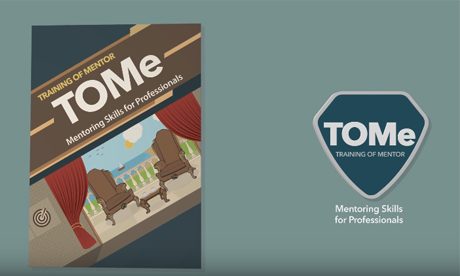Mentoring Skills for Professionals
Course Code TOMe
Duration 4 Days / 32 Hours
Fees 1690 $
Introduction
Mentoring is a critical key for successful and sustainable organizations, through workforce development and transfer of knowledge and skills from previous generations to younger generations by maximizing organization knowledge contents.
Effective mentoring programs consist of clear goals and specific expectations for mentors, mentees and the organization. The steps include: Determining mentoring program goals, participants, mentoring program type that completely matches organization goals, timeline, budget, and method to measure program effectiveness. This program addresses important components to develop and implement a mentoring program.
Who is this program for?
This program is for new professionals in building and implementing mentoring programs who want to provide mentoring to customers, whether external or internal.
Program’s objectives
At the end of this training program you will be able to:
- Recognize the reasons that make it imperative for organizations to develop Mentoring Programs
- Count Mentoring Program Benefits for Mentees, Mentors and Organizations
- Ask Questions that can be Included in Needs Assessment
- Determine 8 Critical Needs for Talents
- Recognize Mentoring Guidelines for Mentees, Mentors and Organizations
- Recognize Critical Success Factors
- Mentor Program Planning
- Determine Mentoring Program Roadmap Components
- Gain Top Management Support and Commitment
- Recognize Program Manager Roles
- Determine Steering Committee or Work Group Provisions
- Choose suitable Structure
- Recognize Mentoring Program Types
- Discover Mentoring Program Pros & Cons
- Develop Recruitment and Marketing Strategy
- Use Three Matching Process
- Recognize the Essentials for Matching Mentors with Mentees via the Internet
- Describe Mentees & Mentors Main Responsibilities and Roles
- Describe Mentoring Partnership Tools and Contents
- Recognize the Mentees & Mentors Instruction Guide Contents
- Recognize the Supervisors Instruction Guide Contents
- Create Mentoring Agreement
- Describe Mentors Types and Roles
- Recognize effective Mentor behavior
- Discover Mentoring Skills
- Develop Mentoring Work-map
- Create Subject list to Discuss
- Present Development Activities
- Facilitate Mentee Goal-setting Process
- Start Mentoring Discussion effectively
- Use Suitable Agendas in Mentoring Meeting
- Avoid 5 Common Traps Leading to Mentoring Failure
- Use Mentor Evaluation Questions
- Use Mentee Evaluation Questions
- Plan from behind
- Wrap up Mentoring Program
- Create a Modern Mentoring Culture
- Recognize the best Learning Millennial Generation and different Mentoring and Learning Methods of the Generation
- Determine Modern Mentoring Practices
- Determine 8 Key Pillars of Modern Mentoring
- Explain Personal and Organizational Benefits for Multi-Generation Workforce through implementing such Mentoring Program Model & Social Learning Program.
- Explain Relationships Links Types that compose Modern Mentoring
- Create and applying a modern mentoring culture
What You Will Learn?
Needs Assessment & Administrative Support
11 Reasons Organizations should set up a Monitoring Program
Benefits of Mentoring for the Organization, Mentees and Mentors
What are your Motives during the Mentoring Process?
Things one should think about when developing and implementing Official Mentoring Program
Questions that can be included during Needs Assessment
8 Essential Needs for Talents
5 primary questions for Concerned Persons
Mentoring Guidelines for the Organization, Mentees and Mentors
Critical Success Factors in Mentoring
Planning the Mentoring Program
What does Success looks like when implementing a Mentoring Program?
Components of the Mentoring Program Roadmap
How to gain Top Management Support and Commitment?
Program Manager Roles
Steering Committee or Working Group Document
Designing the Structure & Effective Matches
5 Essential question for Choosing the Structure
6 Types of Mentoring Programs
Mentoring Program Pros & Cons
Official & Unofficial Mentoring Programs
Mentees & Mentors Recruitment Strategies
4 Tips for Effective Matches
How to Match Mentors with Mentees via the Internet?
What are Mentors & Mentees responsibilities and roles?
Materials development and Preparing Participants
What is the Mentor job description
What is the Mentee job description
8 Important Components in Mentors & Mentees Instruction Guide
4 Important Components in Administrator Instruction Guide
6 Important Components in Mentoring Agreement
4 types of Mentors
5 Roles for Mentors
7 Effective behaviors for Mentors
12 Mentoring Skills
Mentoring & Evaluation
Establishing a list of Discussion topics
Applying Development Activities
Facilitating the Mentee’s Goal Setting Process
8 Methods to make Discussion go easily
Agendas that can be used in Mentoring Meeting
5 Common Traps leading to Mentoring Failure
Mentor Evaluation Questions
Mentee Evaluation Questions
How to plan for behind?
How to Wrap Up a Mentoring Program?
Creating a Modern Mentoring Culture
How the generation sees Mentoring
4 Benefits of Modern Mentoring
8 Key Pillars of Modern Mentoring
5 Models of Modern Mentoring
How to use Modern Technology in Modern Mentoring
Tips to build a Modern Mentoring Culture






